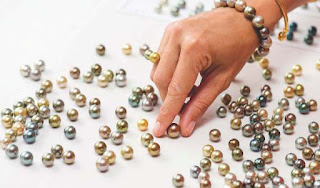Commitment to marine sustainability
CIBJO
pearl report released!
With
fewer than three weeks to go to the opening of the 2018 , 2018, the seventh of the CIBJO commissions'
Special Reports has been released. Prepared by the CIBJO Pearl Commission,
headed by Kenneth Scarratt, it focuses on the growing commitment of pearl
farmers from around the world to set the golden standard for sustainability in
a marine environment.
"Mankind's
impact on the earth's environment is not simply related to saving the
elephants, lions and the rhinoceros, or wild orchids, while these have great
urgency. But they are no greater than the significant issues surrounding how we
control the massive volume of rubbish generated globally that enters our oceans
and seas," wrote Mr. Scarratt.
Surveying
a list of ongoing projects from the Philippines to Australia, the Indonesian
archipelago to West Papua, and Fiji to Bahrain, Mr. Scarratt describes a
community whose long-term livelihood is dependent on its ability to maintain a
pristine ocean environment, and to provide economic opportunity to the
far-flung indigenous communities where pearling is carried out.
"Pearl
farming has often been described as ecological aquaculture," notes Mr.
Scarratt, quoting the Blue Pledge, a new initiative that aims to unite pearl
farmers who actionably seek to contribute to the health of the oceans and the
global climate. "Pearl oysters are filter feeders that require pristine
water conditions in order to produce high-quality pearls. They are also
recognised as an indicator species, meaning that any decline in water quality
has a direct impact on oyster health, pearl quality, and oyster mortality."
"Thus,
while the world around us appears to be desperately struggling with man's
ineptitudes, let us take comfort in the fact that our pearling community can
stand proudly as shining examples to the rest of humanity," Mr. Scarratt
writes.






Comments
Post a Comment